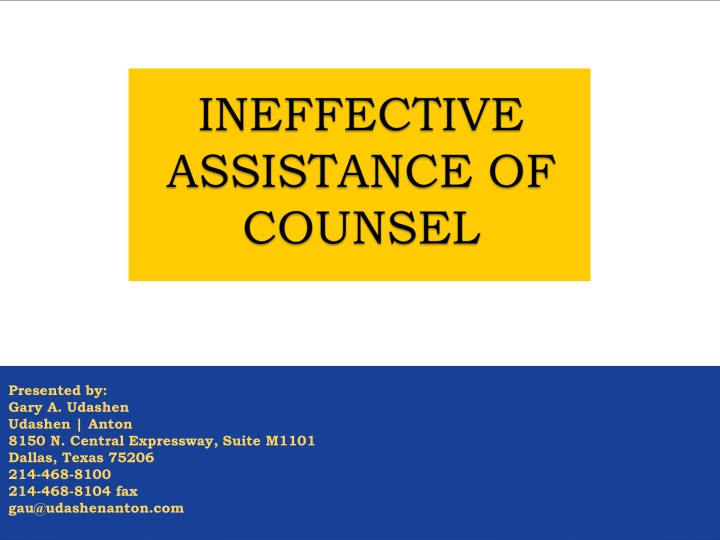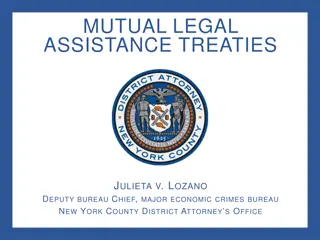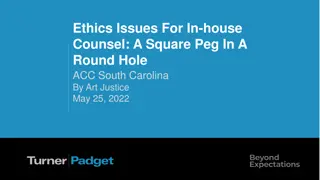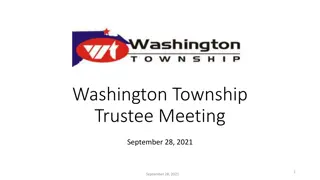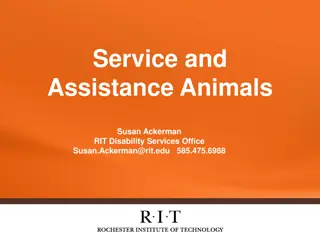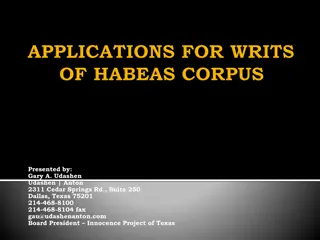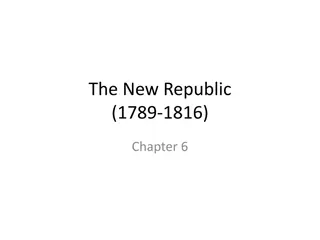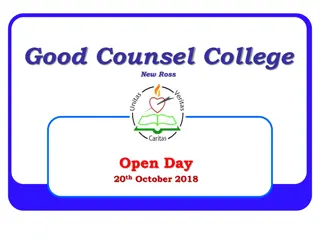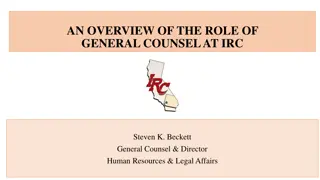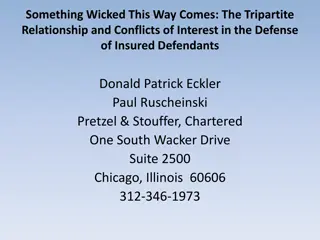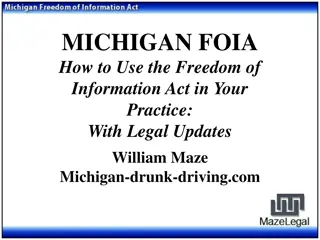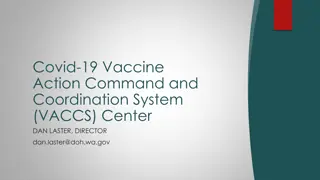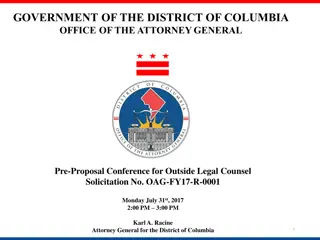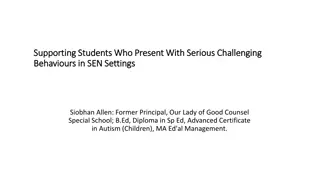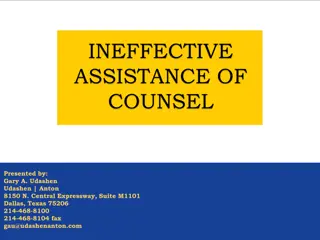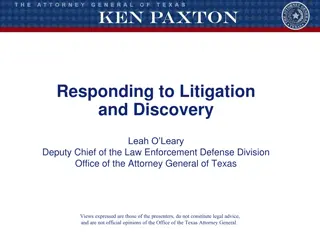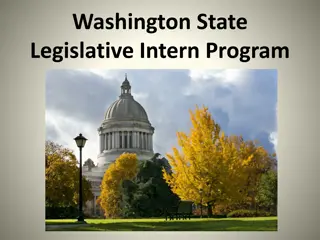Overview of Strickland v. Washington and Ineffective Assistance of Counsel
Strickland v. Washington establishes a two-part test for determining ineffective assistance of counsel. The test requires a showing of deficient performance and resulting prejudice to the defendant. Appellate courts must presume counsel's conduct was reasonable unless proven otherwise. Challenges to counsel's conduct must overcome the presumption of sound trial strategy. The defendant and counsel should have the opportunity to explain actions before being deemed unprofessional. The purpose of the Strickland test is to assess if counsel's actions compromised the adversarial process.
Download Presentation

Please find below an Image/Link to download the presentation.
The content on the website is provided AS IS for your information and personal use only. It may not be sold, licensed, or shared on other websites without obtaining consent from the author.If you encounter any issues during the download, it is possible that the publisher has removed the file from their server.
You are allowed to download the files provided on this website for personal or commercial use, subject to the condition that they are used lawfully. All files are the property of their respective owners.
The content on the website is provided AS IS for your information and personal use only. It may not be sold, licensed, or shared on other websites without obtaining consent from the author.
E N D
Presentation Transcript
Presented by: Gary A. Udashen Udashen | Anton 8150 N. Central Expressway, Suite M1101 Dallas, Texas 75206 214-468-8100 214-468-8104 fax gau@udashenanton.com
Strickland v. Washington, 466 U.S. 668 (1984), test requires Applicant to show: 1. Counsel s performance was deficient. Requires showing that counsel made errors so serious that counsel was not functioning as the counsel guaranteed by the Sixth Amendment. 2. The deficient performance prejudiced the defendant.
An appellate court must indulge a strong presumption that counsel s conduct [fell] within the wide range of reasonable professional assistance; that is, the [appellant] must overcome the presumption that under the circumstances, the challenged action might be considered sound trial strategy. Strickland, 466 U.S. at 689
In reasons for challenged conduct, an appellate court commonly will motivation if any can possibly be imagined and will not conclude the challenged conduct constituted deficient performance unless the conduct was so outrageous that no competent attorney would have engaged in it. the absence of evidence of counsel s assume a strategic Garcia v. State, 57 S.W.3d 436 (Tex. Crim. App. 2001)
Record took the actions that constitute ineffective assistance. Thompson v. State, 9 S.W.3d 808 (Tex. Crim. App. 1999); Johnson v. State, 2021 WL 2448365 (Tex. Crim. App., June 16, 2021) must show why counsel Trial counsel must provide affidavit or testimony.
Under our system of justice, the criminal defendant is entitled to an opportunity to explain himself and present evidence on his behalf. His counsel should ordinarily be accorded an opportunity to explain her actions before being condemned as unprofessional and incompetent. Bone v. State, 77 S.W.3d 828, 836 (Tex. Crim. App. 2002)
Purpose of Strickland test is to judge whether counsel s conduct so compromised the proper functioning of the adversarial process that the trial cannot be said to have produced a reliable result. Thompson v. State, 9 S.W.3d 808 (Tex. Crim. App. 1999)
Appellate court looks to the totality of the representation and the particular circumstances of each case in evaluating the effectiveness of counsel. Thompson, 9 S.W.3d at 813 It is possible that a single egregious error of omission or commission constitutes ineffective assistance. Thompson, 9 S.W.3d 813 by counsel
Ineffective Assistance of Counsel may (should) be raised for first time on a writ. Ex Parte Torres, 943 S.W.2d 469 (Tex. Crim. App. 1997). Trial record is rarely sufficient to show ineffective assistance.
Must show that but for counsel s errors defendant would not have entered a guilty plea. Hill v. Lockhart, 474 U.S. 52 (1985)
Strickland test applies to plea bargaining stage of trial. Deficient advice concerning constitutes ineffective assistance. Defendant must show that he would have accepted the offer, the state would not have withdrawn it and the trial court would have accepted it. plea bargain Lafler v. Cooper, 566 U. S. 156 (2012) Missouri v. Frye, 566 U.S. 134 (2012) Ex parte Argent, 393 S.W.3d 781 (Tex. Crim. App. 2013)
Counsel ineffective for failure to properly advise defendant who was entering guilty plea whether state sentence would run concurrent with his federal sentence. Ex parte Moody, 991 S.W.2d 856 (Tex. Crim. App. 1999)
Failure defendant s entry of guilty plea that he had a viable legal defense that he did not perform an overt act needed to support his conviction constitutes ineffective assistance. to advise defendant prior to State v. Diaz-Bonilla, 495 S.W.3d 45 (Tex. App. Houston [14thDist.] 2016, pet.ref d)
Counsels misinformation to defendant as to his parole eligibility performance. constituted deficient Ex parte Moussazadeh, 361 S.W.3d 684 (Tex. Crim. App. 2012)
Failure consequences assistance. Padilla v. Kentucky, 559 U.S. 356 (2010) to advise defendant conviction of is deportation ineffective of Prejudice advice that guilty plea would not result in deportation when applicant shows he would not have pled guilty had he known he would be deported. Jae Lee v. United States, 137 S.Ct. 1958 (2017) shown from counsel s erroneous
STRATEGIC DECISIONS ARE BASED ON INVESTIGATION The Supreme Court has made clear that strategic choices made after thorough investigation of law and facts relevant to plausible options are virtually unchallengeable. Strickland, 466 U.S. at 690-91 But when choices are made after less than complete investigation, they are reasonable only to the extent that reasonable professional judgments support the limitations on investigation. Strickland, 466 U.S. at 691. And decisions made out of inattention are not strategic and afforded no deference at all. Wiggins v. Smith, 539 U.S. 510, 526 (2003)
Failure of trial counsel to investigate information that someone else committed the crime is ineffective. Ex Parte Amezquita, 223 S.W.3d 363 (Tex. Crim. App. 2006)
Attorney investigate facts of robbery case, telling his client that a videotape committing the offense when no such tape existed, thereby causing defendant to plead guilty to robbery even though he had no memory of committing the offense because he suffered from alcoholic blackouts. found ineffective for failing to existed of him Melton v. State, 987 S.W.2d 72 (Tex. App. Dallas 1998, no. pet.)
Counsel ineffective for lack of awareness of case holding that, on charge for possession of or attempt to possess controlled substance through use of fraudulent prescription form, State had to prove that defendant presented fraudulent form, not just that defendant committed fraud by otherwise legitimate form. interlineating upon Ex Parte Lewis, 537 S.W.3d 917 (Tex. Crim. App. 2017)
Attorneys rendered ineffective assistance by failing to investigate and present mitigating evidence of defendant being abused as a child in capital murder case. Ex parte Gonzales, 204 S.W.3d 391 (Tex. Crim. App. 2006) Trial counsel s failure to impeach witness with his inconsistent statements, made when he told police that he saw shooter s face but could not make it out, constituted deficient performance. Ex parte Saenz, 491 S.W.3d 819 (Tex. Crim. App. 2016)
Failure to object to evidence of polygraph test administered to witness found to be ineffective. Ex parte Bryant, 448 S.W.3d 29 (Tex. Crim. App. 2014) Counsel participate continuance was denied. Cannon v. State, 252 S.W.3d 342 (Tex. Crim. App. 2008) ineffective in where after he failed to for trial motion
Failure of counsel to determine that a prior conviction alleged to enhance misdemeanor DWI to felony did defendant. Ex parte Harrington, 310 S.W.3d 452 (Tex. Crim. App. 2010) not belong to the Counsel ineffective for failing to request an interpreter for the defendant who was deaf. Ex parte Cockrell, 424 S.W.3d 543 (Tex. Crim. App. 2014)
Failure to request limiting instruction. Ex parte Varelas, 45 S.W.3d 627 (Tex. Crim. App. 2001) Failure to file application for probation. Ex parte Welch, 981 S.W.2d 183 (Tex. Crim. App. 1998) Failure instruction when case based entirely on accomplice testimony. Ex parte Zepeda, 819 S.W.2d 874 (Tex. Crim. App. 1991) to request accomplice witness
A defendant has the right under Sixth Amendment to insist that counsel refrain from admitting guilt during the guilt-phase of a capital murder trial, even when counsel s view is that confessing guilt offers the defendant the best chance to avoid the death penalty. McCoy v. Louisiana, 138 S.Ct. 1500 (2018)
Counsel ineffective by failing to object to instruction that defendant was guilty of injury to child if he intentionally and knowingly engaged in conduct causing injury; law was clearly established that injury to child required proof that defendant intended result of offense. Banks v. State, 819 S.W.2d 676 (Tex. App. San Antonio 1991, pet. ref d)
Retained counsel performed deficiently in limiting, for economic reasons, his investigation of medical evidence before advising client to plead guilty. Ex parte Briggs, 187 S.W.3d 458 (Tex. Crim. App. 2005)
Failure to hire DNA expert in sexual assault and kidnapping prosecution performance, although counsel attorneys, doing so was insufficient investigation in this case given the fact that counsel still lacked much understanding of DNA science, and expert testimony likely would have given a boost to the defense beyond what could have been accomplished through cross-examination. (no prejudice found) amounted to deficient other consulted Ex parte Napper, 322 S.W.3d 202 (Tex. Crim. App. 2010)
Defense counsel ineffective for failure to request funds to replace an inadequate expert in firearms and toolmark analysis. additional Hinton v. Alabama, 571 U.S. 263 (2014)
Ineffective assistance based on counsels failure to consult concerning sexual methods of interviewing children with abuse an and expert proper Wright v. State, 223 S.W.3d 36 (Tex. App. Houston [14th Dist.] 2016, pet. ref d)
TEXANS HATE THE IVY LEAGUE Capital murder case Issue of causation over death of fetuses Defense expert available theory Calling the doctor could have presented potential pitfalls for the defense. For instance, the Angelina County jurors might not have been especially receptive to an expert traveling halfway across the country- from Yale-to testify in their small-town, East-Texas courthouse. No ineffective assistance to contradict prosecution Ex parte Flores, 387 S.W.3d 626, 637 (Tex. Crim. App. 2012)
The sentencing process consists of weighing mitigating and aggravating factors, and making adjustments in the severity of the sentence consistent with this calculus. Failure to contact or call to testify twenty character witnesses is ineffective assistance. Milburn v. State, 15 S.W.3d 267 (Tex. App. Houston [14thDist.] 2000, pet. ref d.)
Counsel witness at sentencing phase of capital murder trial who testified that being black created an increased probability of future dangerousness. ineffective for calling expert Buck v. Davis, 137 S.Ct. 759 (2017)
Failure to object during punishment phase to testimony by DEA agent on dangers and societal costs of methamphetamine and prosecutor s closing argument about people bringing in the drug to poison the county s children constituted deficient performance. Ex parte Lane, 303 S.W.3d 702 (Tex. Crim. App. 2009)
Failure of counsel to discover evidence showing that the defendant was not at the scene of a crime used offense at punishment phase constitutes ineffective assistance of counsel. as an extraneous Ex parte Rogers, 369 S.W.3d 858 (Tex. Crim. App. 2012)
Trial counsels failure to investigate and discover defendant s history prejudiced defendant at penalty phase of trial; there probability of less substantial mitigating available. mental health was reasonable sentence; evidence severe was Lampkin v. State, 470 S.W.3d 876 (Tex. App. Texarkana 2015, pet. ref d)
We conclude that Applicant is entitled to a new punishment hearing because his trial counsel s mitigation investigation fell below an objective standard of reasonableness, and had counsel not been deficient, there is a reasonable probability that at least one juror would have struck a different balance and would have answered the mitigation issue differently, voting to spare Applicant s life. Ex Parte Garza, 620 S.W.3d 801 (Tex. Crim. App. 2021)
Rights to effective assistance applies at Motion for New Trial. Cooks v. State, 240 S.W.3d 906 (Tex. Crim. App. 2007) To plausible claim that could have been argued in Motion for New Trial but was not. prove harm, must present a facially Cooks, 240 S.W.3d at 912
To obtain relief in the form of a new direct appeal on a claim of ineffective assistance of appellate counsel, a habeas applicant must show that (1) counsel s decision not to raise a particular point of error was objectively unreasonable, and (2) there is a reasonable probability that, but for counsel s failure to raise that particular issue, he would have prevailed on appeal. Ex parte Flores, 387 S.W.3d 626 (Tex. Crim. App. 2012)
An attorney need not advance every argument, regardless of merit, urged by appellant, but if appellate counsel fails to raise a claim that has indisputable merit under well-settled law and would necessarily result appellate counsel is ineffective for failing to raise it. in reversible error, Ex parte Flores, 387 S.W.3d 626 (Tex. Crim. App. 2012)
Counsel had actual conflict of interest. counsel was engaged relationship with Applicant; trial counsel had access to and control over Applicant s case; trial counsel had a political, financial, and personal interest which colored Applicant. The Court finds that this actual conflict of interest violated Applicant s Sixth Amendment rights. Trial sexual in a coercive his representation of Ex Parte Sanchez, No. WR-84,238-01, 2017 WL 3380147 (Tex. Crim. App. 2017)
